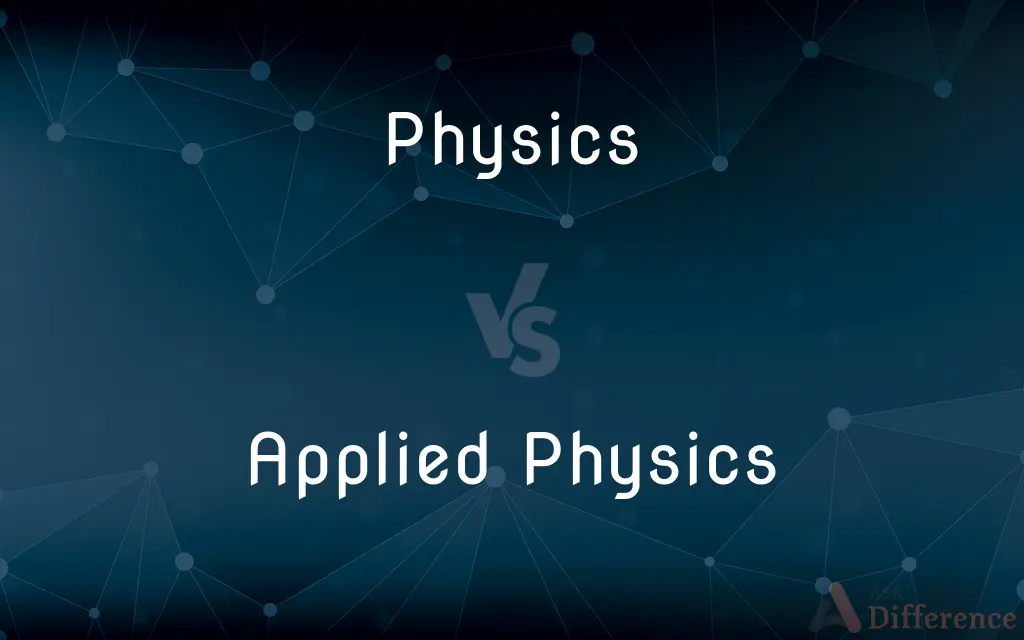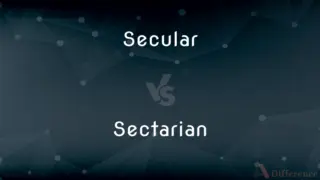Physics vs. Applied Physics — What's the Difference?
Edited by Tayyaba Rehman — By Fiza Rafique — Published on October 1, 2023
Physics is the study of fundamental principles and natural phenomena, while Applied Physics applies these principles to practical problems and technological advancements.

Difference Between Physics and Applied Physics
Table of Contents
ADVERTISEMENT
Key Differences
Physics is the branch of science that explores the fundamental laws and principles governing the universe. Applied Physics, on the other hand, takes the knowledge and principles derived from physics and puts them to practical use.
Physicists seek to uncover the underlying rules that explain the behavior of the physical world, from the smallest particles in quantum physics to the vast cosmos in astrophysics. Applied physicists utilize the insights gained from physics to develop technologies, solve engineering problems, and improve existing systems.
Comparison Chart
Focus
Fundamental principles and phenomena
Practical applications and technology
Nature
Theoretical and conceptual
Application-oriented and practical
Goals
Understand natural laws and behavior
Solve real-world problems and innovate
ADVERTISEMENT
Examples
Quantum mechanics, relativity
Semiconductor physics, optics
Scope
Explores the universe at a conceptual level
Transforms concepts into real devices
Compare with Definitions
Physics
Physics explores the behavior of particles at the quantum level.
Quantum physics delves into the behavior of subatomic particles.
Applied Physics
Applied Physics uses physics knowledge for technological advancements.
Applied physics enhances medical imaging devices.
Physics
Physics seeks to understand natural phenomena through experimentation.
Newton's laws of motion are fundamental in physics.
Applied Physics
Applied Physics bridges the gap between theory and real-world solutions.
Applied physics improves computer processor designs.
Physics
Physics underpins our understanding of the physical world.
Physics explains the fundamental forces of nature.
Applied Physics
Applied Physics contributes to innovations in various industries.
Applied physics plays a key role in semiconductor manufacturing.
Physics
Physics is the study of the fundamental laws of the universe.
Einstein's theory of relativity is a cornerstone of physics.
Applied Physics
Applied Physics applies theoretical concepts to practical problems.
Applied physics helps design efficient solar panels.
Physics
Physics investigates the behavior of matter, energy, and space.
In physics, we examine the motion of celestial bodies.
Applied Physics
Applied Physics focuses on using physics principles for practical benefits.
Applied physics optimizes transportation systems.
Physics
(used with a sing. verb) The science of matter and energy and of interactions between the two, grouped in traditional fields such as acoustics, optics, mechanics, thermodynamics, and electromagnetism, as well as in modern extensions including quantum mechanics, relativity theory, cryogenics, solid-state physics, particle physics, and plasma physics.
Physics
(used with a pl. verb) Physical properties, interactions, processes, or laws
The physics of supersonic flight.
Physics
(used with a sing. verb) Archaic The study of the natural or material world and phenomena; natural philosophy.
Physics
The branch of science concerned with the study of the properties and interactions of space, time, matter and energy.
Newtonian physics was extended by Einstein to explain the effects of travelling near the speed of light; quantum physics extends it to account for the behaviour of atoms.
Physics
The physical aspects of a phenomenon or a system, especially those studied scientifically.
The physics of car crashes would not let Tom Cruise walk away like that.
Physics
Plural of physic
Physics
The science of nature, or of natural objects; that branch of science which treats of the laws and properties of matter, and the forces acting upon it; especially, that department of natural science which treats of the causes (as gravitation, heat, light, magnetism, electricity, etc.) that modify the general properties of bodies; natural philosophy.
Physics
The science of matter and energy and their interactions
Common Curiosities
How is physics used in everyday life?
Physics principles are applied in technology, engineering, and various scientific fields.
What are some key branches of physics?
Branches of physics include classical mechanics, quantum physics, electromagnetism, and thermodynamics.
What is physics?
Physics is the scientific study of natural laws and the behavior of matter, energy, space, and time.
What are some famous physicists in history?
Albert Einstein, Isaac Newton, and Marie Curie are notable physicists.
What are examples of applied physics in technology?
Applied physics is used in electronics, telecommunications, medical devices, and materials science.
What role does applied physics play in innovation?
Applied physics drives technological advancements and contributes to innovation in many industries.
How does applied physics differ from theoretical physics?
Applied physics focuses on using physics knowledge for practical applications, whereas theoretical physics explores fundamental principles.
What is applied physics?
Applied physics is the practical application of physics principles to solve real-world problems and develop technology.
How does physics contribute to our understanding of the universe?
Physics helps explain the fundamental forces and behavior of everything in the universe.
Can you provide an example of applied physics in action?
The development of semiconductor devices like computer chips is a prime example of applied physics in technology.
Share Your Discovery

Previous Comparison
Secular vs. Sectarian
Next Comparison
Schema vs. DatabaseAuthor Spotlight
Written by
Fiza RafiqueFiza Rafique is a skilled content writer at AskDifference.com, where she meticulously refines and enhances written pieces. Drawing from her vast editorial expertise, Fiza ensures clarity, accuracy, and precision in every article. Passionate about language, she continually seeks to elevate the quality of content for readers worldwide.
Edited by
Tayyaba RehmanTayyaba Rehman is a distinguished writer, currently serving as a primary contributor to askdifference.com. As a researcher in semantics and etymology, Tayyaba's passion for the complexity of languages and their distinctions has found a perfect home on the platform. Tayyaba delves into the intricacies of language, distinguishing between commonly confused words and phrases, thereby providing clarity for readers worldwide.
















































